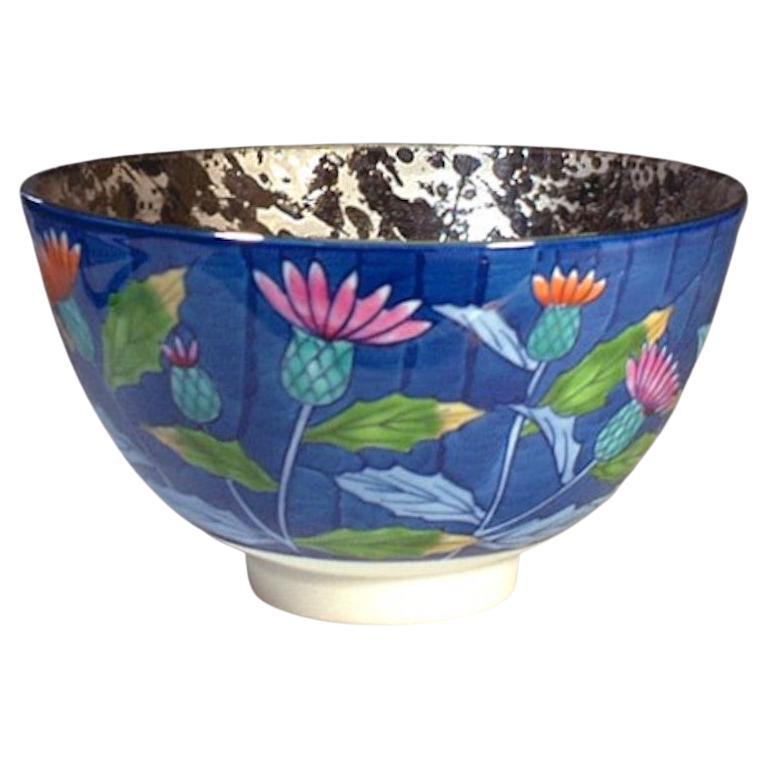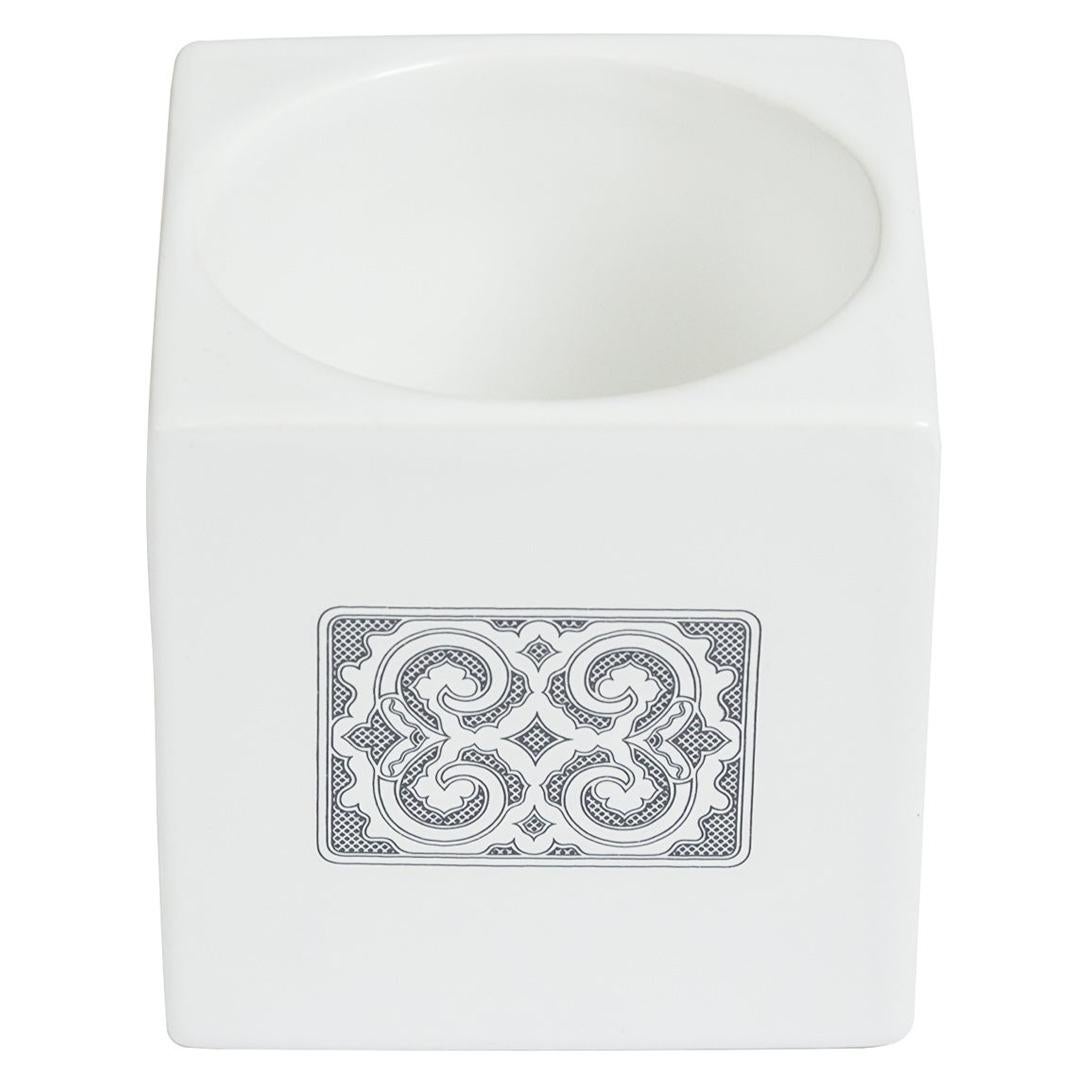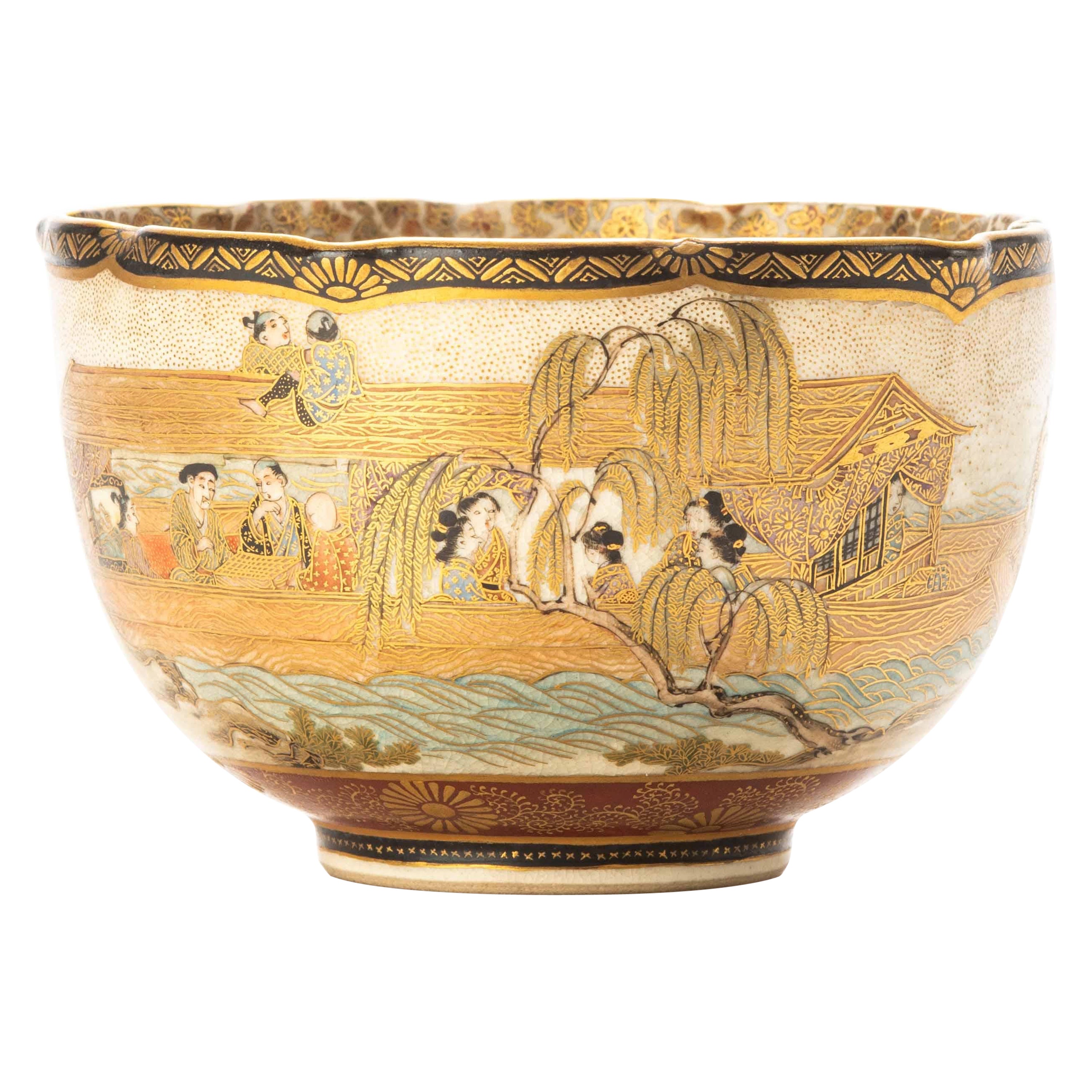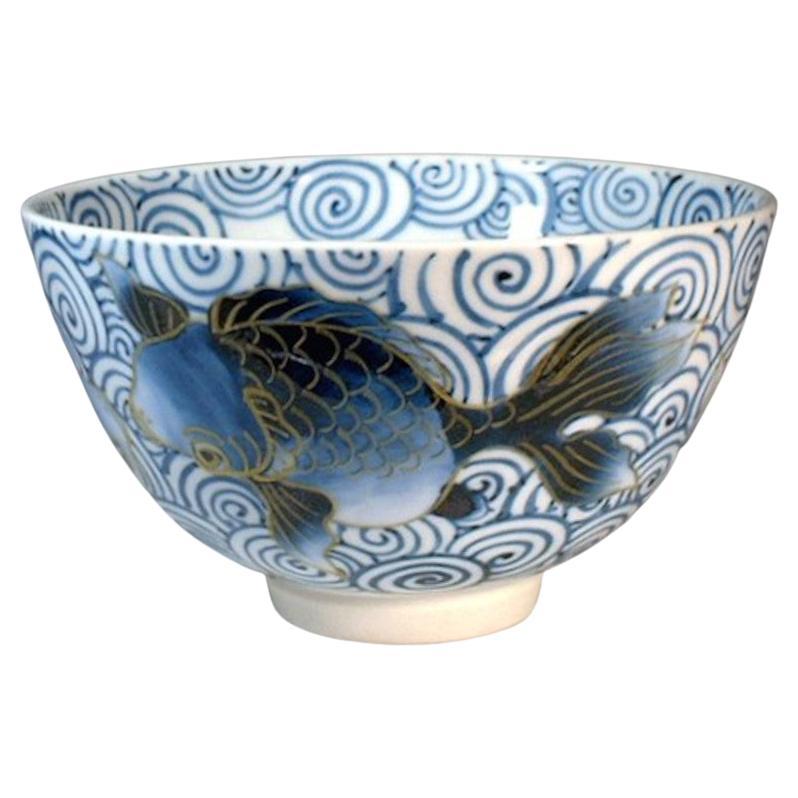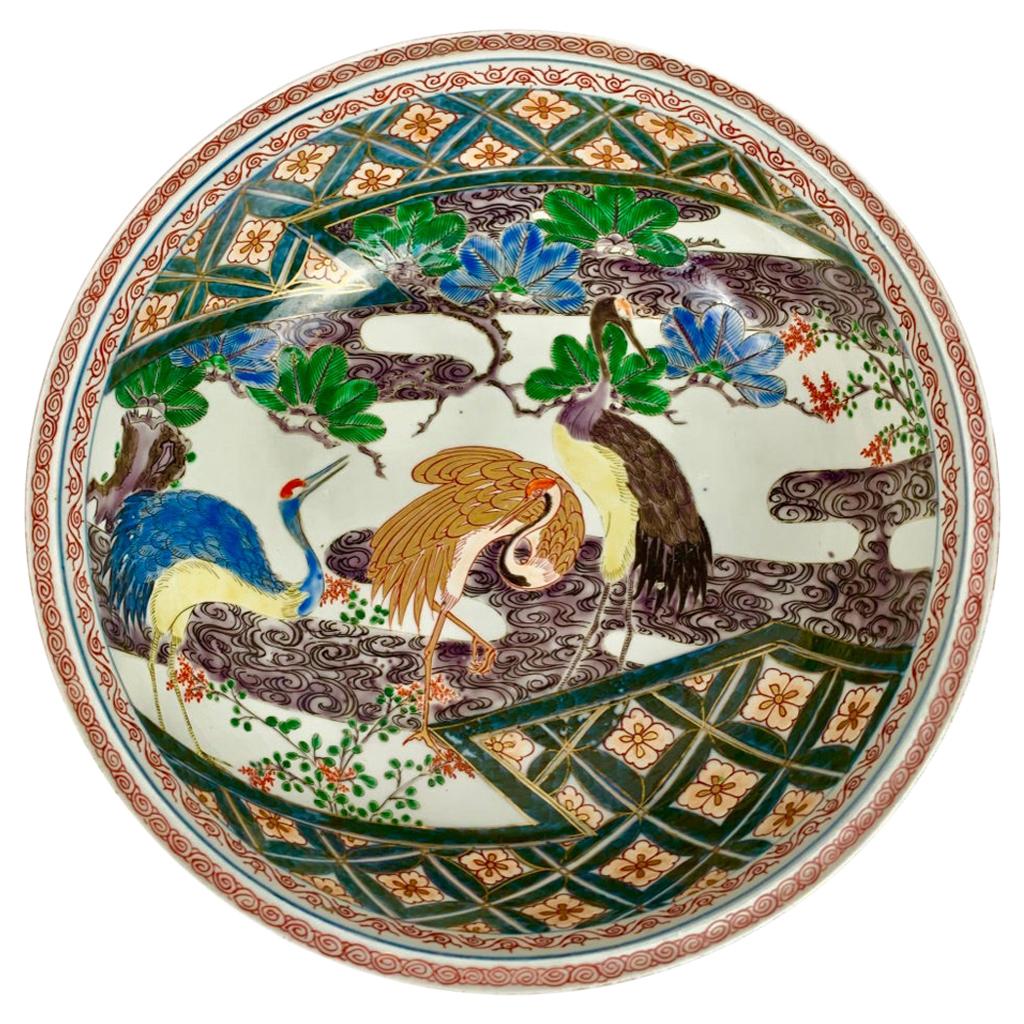Items Similar to Japan hares matcha bowl
Want more images or videos?
Request additional images or videos from the seller
1 of 6
Japan hares matcha bowl
About the Item
Matcha bowl in clay decorated with two hare, partly glazed.
A fine contrast between the unglazed foot, which retains the raw color and rough, matt appearance of the clay, and the rest of the bowl, which is partly glazed with a brown layer with a smooth and shiny appearance. The body is underglazed with two running hares and a sayagata motif (derived frow swastika, a symbol of good fortune).
Unidentified mark on the foot.
In Japanese, the hare and the rabbit are referred to by a single word: usagi. The animal is one of the twelve animals of the zodiac in Sino-Japanese astrology. It also plays a role in may folk tales and legends.
The bowl is irregular shape and decoration are typical of the wabi-sabi aesthetic, which is based on simplicity, randomness and the natural patina of time. When preparing matcha tea, most of the bowl is left empty so the colors of both the matcha and the bowl can be admired.
Accompanied by its original transport box, including the seal and various inscriptions.
- Dimensions:Height: 3.15 in (8 cm)Diameter: 4.61 in (11.7 cm)
- Style:Japonisme (In the Style Of)
- Materials and Techniques:
- Place of Origin:
- Period:
- Date of Manufacture:1900-2000
- Condition:
- Seller Location:PARIS, FR
- Reference Number:
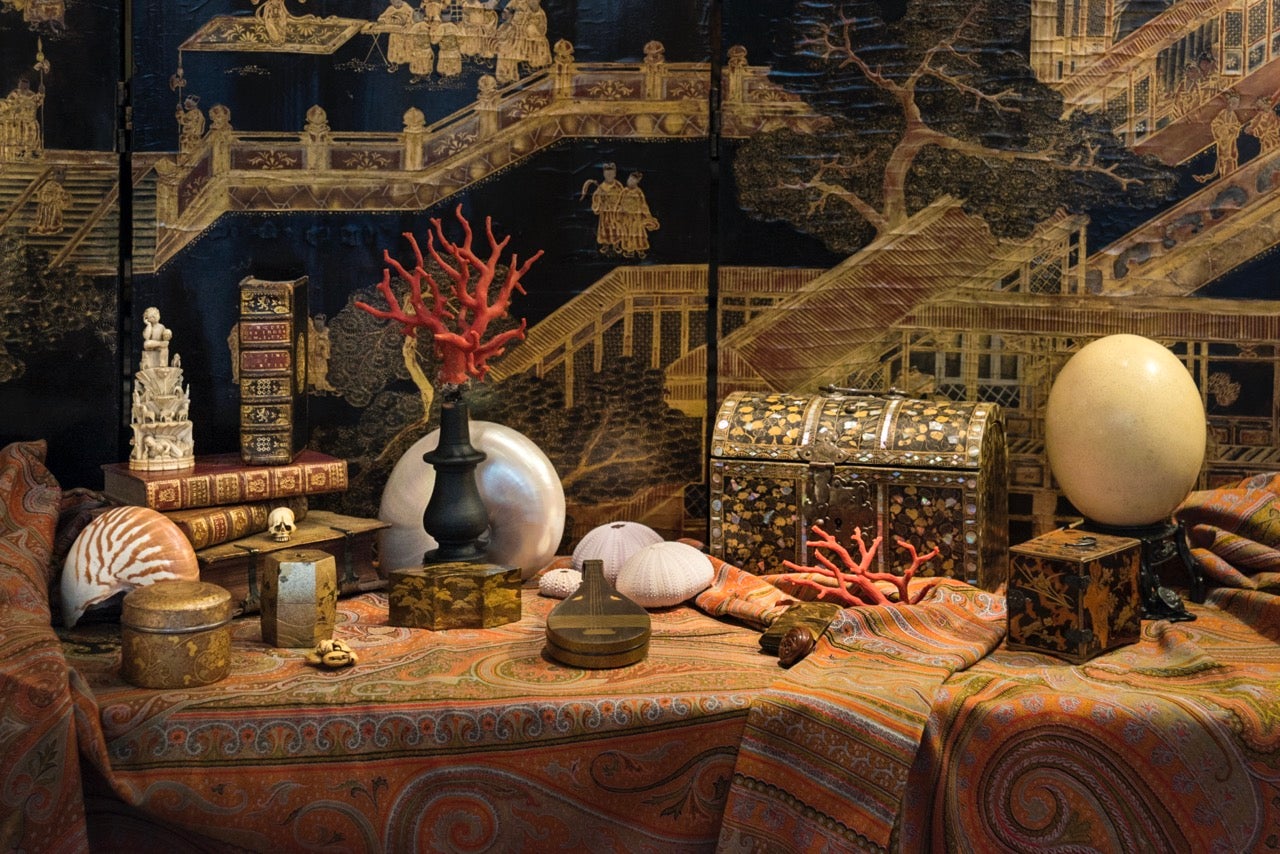
About the Seller
No Reviews Yet
Vetted Seller
These experienced sellers undergo a comprehensive evaluation by our team of in-house experts.
Established in 2013
1stDibs seller since 2023
- ShippingRetrieving quote...Ships From: PARIS, France
- Return PolicyA return for this item may be initiated within 7 days of delivery.
More From This SellerView All
- Japanese small round bronze hare Meiji eraLocated in PARIS, FRSmall round hare in bronze with dark brown patina, standing on its four legs. In Japanese, the hare and the rabbit are referred to by a single word: usagi. The animal is one of the t...Category
Antique Late 19th Century Japanese Japonisme Sculptures and Carvings
MaterialsBronze
- Japanese large round bronze hare Meiji eraLocated in PARIS, FRRound hare in bronze with a dark brown patina, standing on two legs. In Japanese, the hare and the rabbit are referred to by a single word: usagi. The animal is one of the twelve an...Category
Early 20th Century Japanese Japonisme Sculptures and Carvings
MaterialsBronze
- Mounted Imari Porcelain Perfume FountainLocated in PARIS, FRPerfume fountain in porcelain Imari kinrandé mounted in gilt bronze from the same set of porcelain. The cup and the bowl form the base, the pot covers the perfume container...Category
Antique Late 18th Century Chinese Ceramics
MaterialsBronze
- Japan mice treasure bag MeijiLocated in PARIS, FRJapanese bronze representing two mice, one of them pulling a treasure bag. The mouse or the rat (both called nezumi in Japanese), one of the zodiac signs, is a symbol of fortune. T...Category
Late 20th Century Japanese Japonisme Metalwork
MaterialsBronze
- Japanese golden kobako flowers Edo period 18th centuryLocated in PARIS, FRQuadrangular kobako box decorated with flowers in gold and blue lacquer with aogai inlay. Lid and sides in fundame lacquer, underside and interio...Category
Antique 18th Century Japanese Japonisme Lacquer
MaterialsGold
- Japanese bronze okimono turtle (sculpture)Located in PARIS, FROkimono sculpture of a bronze turtle, tail retractable. In Japan, the turtle (kame) is a symbol of longevity and an auspicious animal. It is believed to bring ten thousand years of h...Category
Antique Late 19th Century Japanese Japonisme Sculptures and Carvings
MaterialsBronze
You May Also Like
- Japanese Contemporary Blue Platinum Pink Porcelain Matcha Tea Bowl by Master, 3Located in Takarazuka, JPExquisite contemporary Japanese porcelain matcha tea bowl, a unique piece platinum-gilded on the inside and hand painted in vivid pink and green on the outside set...Category
21st Century and Contemporary Japanese Meiji Tea Sets
MaterialsGold
- Matcha bowl in ceramic from the SoShiro Ainu collectionBy SoShiroLocated in London, GBThe matcha bowl from SoShiro’s Ainu collection, a collaboration between award-winning artist Toru Kaizawa and Shiro Muchiri, is the perfect ceramic tea war...Category
2010s Italian International Style Ceramics
MaterialsCeramic, Clay, Kaolin
- A Japanese Satsuma ceramic lobed bowlLocated in Milano, ITSatsuma ceramic lobed bowl with curved corners and embellished with a refined scene of daily life along a watercourse on the outside. The interior is adorne...Category
Antique Late 19th Century Japanese Japonisme Ceramics
MaterialsCeramic
- Japanese Ceramic Bowl Makuzu Kozan Utusushi KenzanBy Makuzu KozanLocated in Atlanta, GAA rare ceramic bowl with over glaze painted decoration by Japanese imperial potter Makuzu Kozan ((1842–1916). Unlike the better known works Kozan made for the expositions in the west and export to the foreign market, this piece exemplifies his work for the domestic market and the tea ceremony. The bowl was made in the so called "Utusushi" Ogata Kenzan (1663-1743), an celebrated Edo painter and ceramicist. Utusushi is loosely translated as "in the spirit of". It is not at all a simple imitation of a master, but a Japanese concept of embracing the spiritual essence of a master while the creator is free to mix in his or her own unique artistic interpretation and flavor. The bowl was made to hold fruits during the tea ceremony. It has a very distinguished form with a circular lower body morphing into a square upper portion that further opening with flared rim. The surface has a grey glaze onto which Asagao flowers (Japanese morning glory) on the vines were painted in a free and poetic style. White was used for the petals, green for the leaves with touches of gold highlight. Asagao, the symbol of the summer was rendered in the spirit of Ogata Kenzan, and interestingly the shape of the blossom echoes the unique form the bowl. It was likely reserved for the tea ceremony during the summer months. Under the base, Kozan was signed in black on an white porcelain plaque inlay. For two similar examples of Kozan's work Utusushi Kenzan, see Page 168-169 of the book: Sekai ni Aisa Reta ya Kimono Miyagawa Kozan Makuzu...Category
Antique Early 1900s Japanese Japonisme Ceramics
MaterialsCeramic
- Contemporary Japanese Blue Gray Gold Porcelain Matcha Tea Cup by Master ArtistLocated in Takarazuka, JPJapanese contemporary porcelain tea cup/matcha cup, hand painted in blue underglaze in stunning shades of blue and gray on an elegantly shaped ovoid porcelain body, a signed piece by highly acclaimed master porcelain artist in the Imari-Arita tradition. In 2016, the British Museum added a work by this artist to its collection of contemporary Japanese porcelain, a large lidded jar in the Imari-Arita polychrome enamel tradition. This artist is the recipient of numerous awards for his exceptional porcelain work and his unique signature gold and platinum work on porcelain. His profile is available upon request. This stunning porcelain Japanese matcha tea cup depicts elegant gold fish in soft shades of blue, decorated with gold swimming all around the body of the vase, the intricate wave pattern indicates that the fish are swimming in the ocean. Two bands of exquisite floral patterns decorate the top of the vase all the way to the rim, to add another layer of interest to this piece. “Fired-on gold,” this artist’s signature style, highlights unique techniques for incorporating gold and platinum into the hand painting and multiple firing processes that yield a stunningly opulent look. The polychrome overglaze is fired at 800 degrees, followed by the application of gold and platinum that are fired at slightly lower temperature to maintain the luster of the precious metals. As a result, a single piece may undergo as many as 5-10 firings. This artist's profile is available upon request. This hand-painted porcelain Japanese tea cup...Category
21st Century and Contemporary Japanese Meiji Tea Sets
MaterialsGold
- Imari Porcelain Bowl, Meiji Period, Japan, 19th c.Located in West Palm Beach, FLHand decorated Japanese Meiji period porcelain bowl. The interior hand painted scene depicts three birds sitting on the limb of a tree. The reverse is hand painted with underglaze bl...Category
Antique 1880s Japanese Japonisme Ceramics
MaterialsEnamel
Recently Viewed
View AllMore Ways To Browse
Zodiac Bowl
Running Rabbit
Blue Porcelain Chinese Ducks
19th Century Ginger Jar Rose
Bencharong Porcelain
Famille Verte Bowl
Shumei Fujii
Ceramic Elephants
Chinese Immortal Plate
Chinese Porcelain Bowl Famille Verte
Famille Immortal
Jun Porcelain
Thai Bencharong
Chinese Porcelain Tea Caddy
Kinkozan Pottery
Yamanaka And Co
Antique Yixing Teapot Marks
Asian Mud Figures
